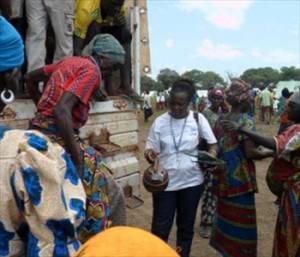The Central African Republic (CAR) has long been associated with political instability and humanitarian need. President François Bozizé’s government ascended to power through a coup in March 2003. However, on March 24th 2013, the Séléka coalition of armed groups seized control in the capital city of Bangui. The deposed Bozizé fled the country, with a coalition leader, Michel Djotodia, declaring himself to be the new president.
The coup has worsened the CARs already perilous humanitarian situation, plunging the country deeper into chaos. Amy Martin, who heads the OCHA (the UN Office for the Coordination of Humanitarian Affairs) branch in Bangui, has stated that one of the capital’s central needs is the security and protection of its civilians. Indeed, there have been widespread reports of human rights abuses, committed by both Séléka militias and national security forces. Human Rights Watch stated in May that: ‘When the Séléka took control of Bangui, the rebels went on a looting spree, killing civilians, raping women, and settling scores with members of the Central African Armed Forces’. In April, the United Nations Security Council expressed its anxiety regarding the worsening situation in the CAR, calling for accountability by ‘those responsible for violations and abuses of international humanitarian and human rights law’.
While the OCHA has estimated that the country’s entire population has been affected by the crisis, the children of the CAR have been particularly affected for a number of reasons.
Firstly, UNICEF has stated that approximately 2 million children are without access to basic social services. For example, the provision of healthcare outside of the country’s main hospitals has been unpredictable. The Médecins Sans Frontières’ head of mission in the CAR, Ellen Van Der Velden, commented that, ‘In some areas [of Bangui] the health centres are functional, in others they are closed, again in others minimal services are being delivered’. With UNICEF predicting that 14,000 children will suffer from life threatening malnutrition because of the looting and closure of nutritional centres, the absence of a stable healthcare service could be disastrous.
Furthermore, the crisis has severely disturbed the education system. The violence has displaced thousands of children and teachers in Bangui, leading to the closure of many schools. The education system throughout the country was subsequently affected, with half of its schools becoming shuttered. UNICEF has stated that at least half of the CAR’s schools remained closed one month after the seizure of power by the Séléka coalition, and has estimated that over a million children are not attending school as a consequence. Many schools have been looted since the coup, depriving them of basic supplies and preventing emergency distributions due to the possibility of further pillaging. Subsequently, the CAR’s education ministry is doubtful about the re-opening of schools in the near future, with Education Minister, Marcel Loudegue, stating that ‘the children are understandably at home because the security situation demands it’.
Finally and most troublingly, armed groups have continued to recruit children. Children in the CAR are at great risk of being forcibly recruited, with a UNICEF spokeswoman commenting that ‘most vulnerable are children who have lost their home, have been separated from their families, or were formerly associated with armed groups’. The agency has stated that over 2000 children were part of armed groups before the current crisis, and that these numbers have increased after the coup. Indeed, Amy Martin has declared that ‘the presence of child soldiers is evident amongst the ranks of Séléka’. Furthermore, the United Nations High Commission for Refugees estimated in March that one fifth of children not in school in the CAR have been forcibly recruited, demonstrating the complexity of the crisis and the impact of the closure of schools.
While some organisations have taken measures to alleviate the impact of the crisis on the CAR’s children, there is still a lot of work to be done. UNICEF vaccinated over 120,000 children in Bangui from measles between May 22nd and 24th. However, the CAR remains neglected by the wider international community, because its crisis is essentially viewed as being a domestic one with some wider repercussions, but which are less of a concern for international peace and security than the crisis’ in states such as Somalia. Subsequently, actors such as the OCHA have suggested that the humanitarian appeal of $139 million for the CAR is under-funded. The situation is further hindered by access issues, with hundreds of thousands of citizens currently cut off from aid supplies. The deputy head of the OCHA office in Bangui, Abdoulaye Sawadogo, has stated that the access difficulties are ‘mainly due to security reasons, which prevents humanitarian organisations [from] resum [ing] their operations’.
The CAR undoubtedly needs greater attention from the international community if its humanitarian crisis is to be alleviated and its children are to be protected. Thibaud Lesuer, the CAR analyst for the International Crisis Group, has suggested that securing Bangui, creating a disarmament, demobilization and reintegration process and reforming the security sector are essential requirements for the country to return to a minimum security level and to begin its recovery. Whether the international community will be willing to assist the CAR to achieve these aims, however, remains to be seen.
Dan Browne
http://www.irinnews.org/report/97780/urgent-humanitarian-needs-in-post-coup-central-african-republic
http://allafrica.com/stories/201306070505.html
http://www.irinnews.org/report/97921/children-bear-brunt-of-car-crisis

